Although I have been unable to lead the "First Saturday" wetland walks at Chapel Trail Nature Preserve in nearby Pembroke Pines, I try to get out there at least once every week. I go early and only on weekdays. This affords less contact with other visitors so that social distancing is not a problem.
The extensive wet prairies in the preserve have suffered from high water conditions due to unusually heavy rain which included a visit from Tropical Storm Eta. High water disperses fish and other prey items, so the herons and other wading birds must search widely and are not as concentrated as is usually the case as the winter dry season advances.
Last week I saw only sixteen bird species. This time of year, twenty or more would be the norm. The second of two Great Egrets flew in and settled in the spikerush (actually, technically classified as a sedge and not a rush) which blankets the prairie:
The other Great Egret, resting on the canoe dock, showed signs that it was approaching breeding condition: trailing plumes, green lores and brightened yellow beak with darkening tip:
The most common bird species seen was the Yellow-rumped (Myrtle) Warbler. Flocks of five or six and up to 10 or 12 individuals moved together from tree to tree in the upland areas. Their winter plumage is greatly subdued as compared to their bold black, white and yellow breeding colors. Females have brown backs during winter, and first year birds have dull plumage. Some are very pale, like this specimen:
Others are dark brown, like this female. The intensity of their yellow rump and lateral breast patches also varies:
In any plumage, their namesake "butter-butt" rump patch is usually obvious:
This is a spring male Yellow-rump which I encountered in Illinois:
Three other warbler species were present--
Northern Parula male...:
...Prairie Warbler...
...and Palm Warbler:
Through the brush, I obtained a clear view of a Brown Thrasher which eyed me apprehensively:
Exotic Gray-headed Swamphens foraged on the roots and tender stems of the spikerush. They were persecuted and subjected to an eradication campaign in which over 3,000 were shot because it was feared that they would decimate this plant, which is a mainstay in the ecology of the Everglades. In fact, the sedge appears to be flourishing, as are the swamphens:
They habitually flick their tails upward to reveal the white under-tail coverts. Like a flashing taillight, this can make them easy to find amid the spikerush:
One swamphen took flight and provided a blurry image:
I remembered this photo of a pair of Gray-headed Swamphens reflecting in still water at Chapel Trail, back in October, 2014. Yes, there are only two birds here:
Native relatives of the alien swamphens, American Coots took turns diving:
Another member of the rail, moorhen and coot family (Family Rallidae), a Common Gallinule (formerly called Moorhen) retreated through the sedges:
An Anhinga spread its wings as it occupied a post near the dock:
Soon the male Anhinga will develop green breeding-season "goggles," as modeled by one I photographed in early January:
In the adjacent dry pasture, my favorite Longhorn cow grazed. I assumed that the white heron nearby was a Cattle Egret, but close inspection on my computer screen revealed it has a bluish gray bill with a black tip, characteristics of an immature Little Blue Heron:
Nearby, her calf is starting to sprout horns:
On the way out of the preserve, a passing shower spawned a rainbow, visible from the parking lot:
= = = = = = = = = = = = = = =
Linking to:
Fences Around the World
Skywatch Friday
Weekend Reflections
Saturday's Critters
BirdD'Pot
Camera Critters
All Seasons
Wordless Wednesday (on Tuesday)
Natasha Musing
Our World Tuesday
Please visit the links to all these posts to see some excellent photos on display
________________________________________________



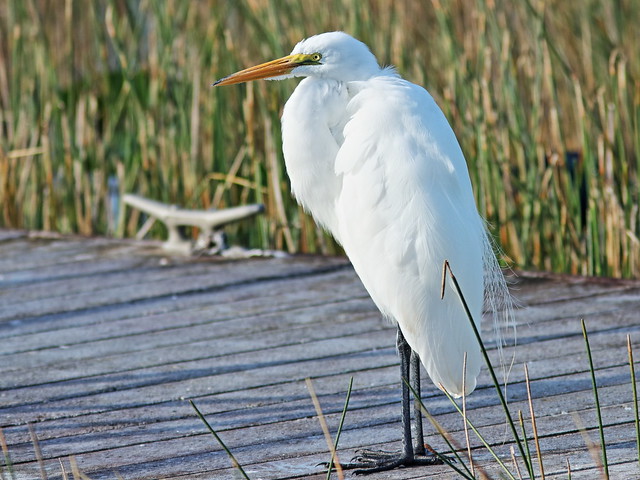



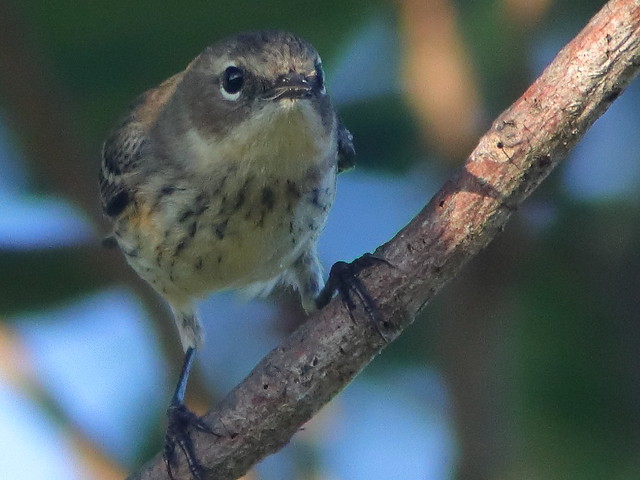
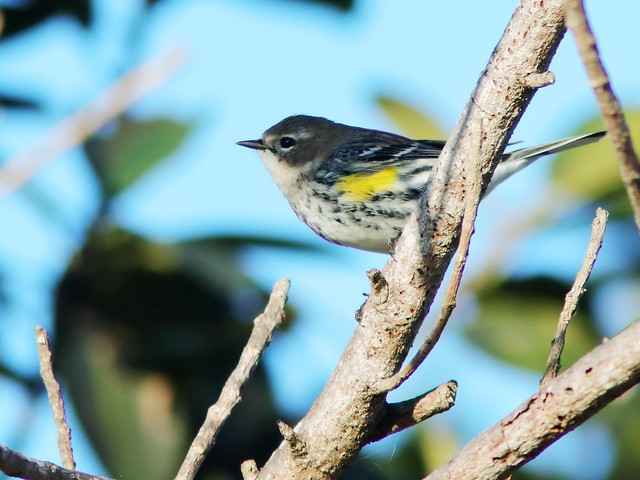







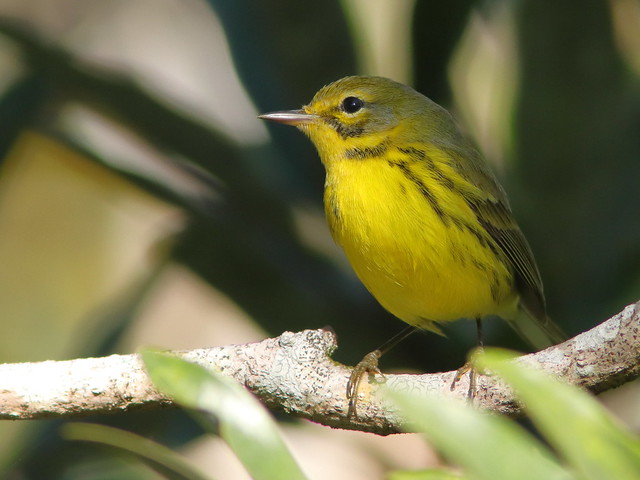






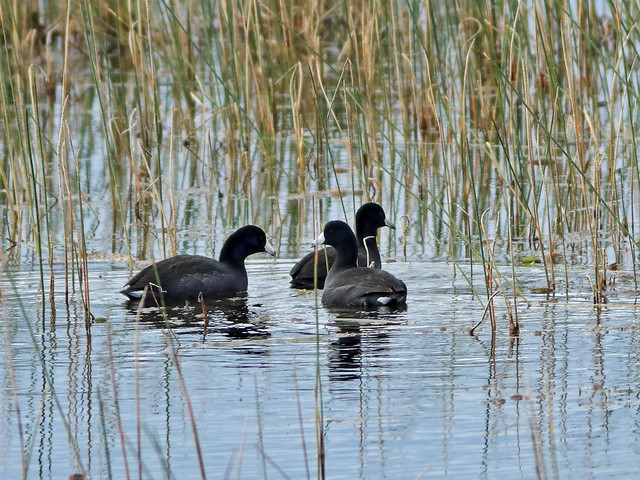

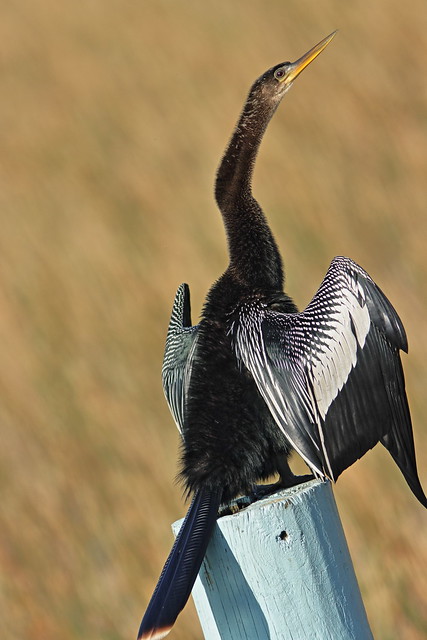




All I can say is wow! You are so gifted with the knack of knowing just when to snap that shot.
ReplyDeleteHow nice, I just see that you want to link to "Nature Thursday" again.
ReplyDeletePlease do not forget ;-)
The bird pictures are so beautiful.
The elegant silver row inspires me, especially the photo of his landing.
But all other snapshots inspire me again very much!
And the beautiful rainbow is a good way to end the post.
Warm greetings from Germany
What a beautiful set of images on this post. I love the swamphens, I have never heard of them before. I love your longhorn cow and calf. I first ran into Anhinga's at New Orleans' Audobon Park. They are so ancient looking.
ReplyDeleteWundervolle Vogelaufnahmen, sehr professionell. Danke für`s Zeigen. Der Regenbogen steht für Frieden in der ganzen Welt, herzlichst Klärchen
ReplyDeleteI always enjoy going on a walk with you in the wetlands. I swear your photos look like the birds pose for you.
ReplyDeleteI had to smile when I read that you only saw 16 species on this outing, Kenneth, but what colorful ones they certainly were as shown here. Most days, I am lucky if I see a couple species and these are usually the Mallard Ducks or Canada Geese on the Nashua River below our apt windows.
ReplyDeleteYou have some gorgeous photos. I love seeing all these beautiful birds. You may not have seen as many species as you normally would but for me in the snowed in north seeing these was better than seeing more. Happy Holidays!
ReplyDeleteI always enjoy your bird photos. Beautiful rainbow sky!
ReplyDeleteBeautiful shots.
ReplyDeleteI too love birding nowadays. They are most colourful to watch
ReplyDeleteHello, Ken
ReplyDeleteAwesome shots of the Great Egret. The Warblers are all beautiful, great comparison shots of the spring and winter male Yellow-rumped Warblers. Is the Gray headed Swamphen the same as a Purple Gallinule? Cute shot of the Longhorn calf. Love the rainbow! Your photos and post are beautiful. Thank you for linking up and sharing your post. Take care, have a happy weekend! PS, thank you for leaving me a comment. Merry Christmas to you and your family!
Such a great collection of birds! Love seeing all the little warbler photos and those swamphens are really interesting. Beautiful photos of everything as always. Hope you have a wonderful holiday week!
ReplyDeleteHello Kenneth
ReplyDeleteI had often tried to photograph great egrets, the bright white and my focus were not always in agreement .. ;-)) nice also the swamp deer, great color and the other bird photos are wonderful portrais
Greetings Frank
It was definitely my pleasure going to the wetlands with you! (Over abundance of water...while we are in severe drought). From the "butter butt" to the four (two) swamphens...we call them purple Gallinule ... to that beautiful anhinga! May your holiday week be blessed with happiness. Thanks so much for sharing this post today and linking up throughout 2020.
ReplyDeleteJust wanted to let you know, a yellow-rumped warbler is indeed the bird I was trying to identify. It flew away from me yesterday, and I saw the yellow rump very clearly. Thank you so much.
ReplyDeleteBeautiful shots!
ReplyDeleteSuch lovely and breathtaking photos! Thank you and Merry Christmas!
ReplyDeleteGreat photos. I especially love those of the egret and the anhinga.
ReplyDeleteThanks for sharing at http://image-in-ing.blogspot.com/2020/12/quarantine-christmas.html. I hope you have a wonderful Christmas!
You sure know my friend Kenneth how I really adore herons and cranes and egrets the most! Super thank you for sharing them to us this week :) Merry Christmas Kenneth!!!
ReplyDeleteBeautiful you caught the spreaded wings of the male yellow rump!
ReplyDeleteLove the blue of this swamphen - a blue I would use in my paintings:)
Had not realized the longhorn could have such a many colored hide.
A merry Christmas to you and your family. Can you be together with them, or are there restrictions? Hope not! But we will have a post for All Seasons coming weekend! Jesh
beautyful pictures
ReplyDeletemerry Christmas
wonderful captures!
ReplyDeleteIt's always such a visual treat to visit your blog, Ken.
ReplyDeleteThe Anhinga is one handsome bird. I love the Swamp hens too. We are lucky to spot them here too. Though I am yet to see one in flight.
I love your cover image.
Here's wishing you and Mary Lou a blessed Yule and a precious new 2021 with more fascinating birding jaunts.
It's always interesting to read your posts because you point out lots of things that I would never notice on the birds. Wonderful finds and a rainbow to finish the day!
ReplyDeleteSo glad you joined us at 'My Corner of the World' this week! Merry Christmas!